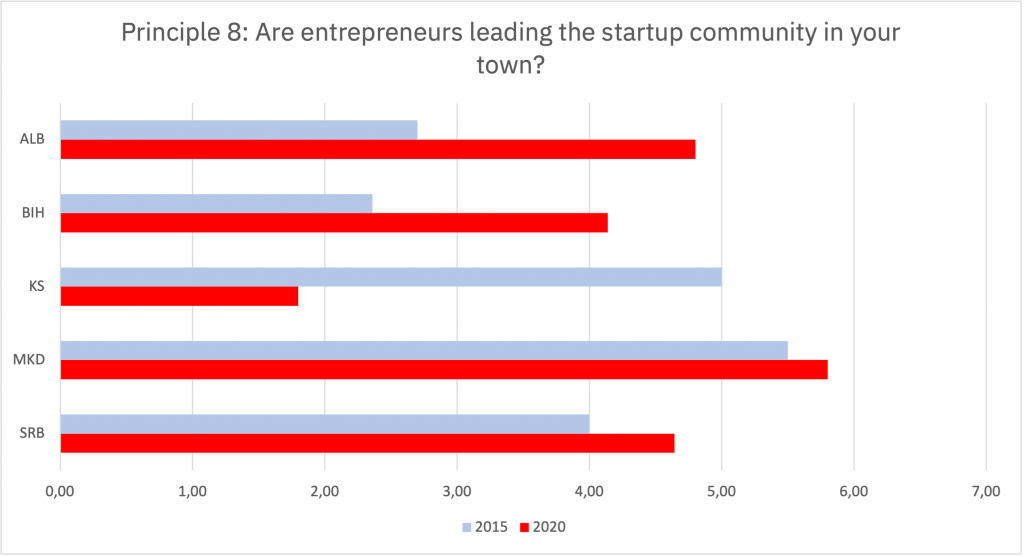The central foundation in the building of a viable and successful startup community, in the words of Brad Feld, is that entrepreneurs must lead the startup community. Nothing else will do. No other actor in the entrepreneurial ecosystem can replace the entrepreneur in building a startup community. Feld goes one step further in stating that a startup community that entrepreneurs do not lead will not grow, thrive or last.
We asked our interviewees “are entrepreneurs leading the startup community in your town?”
The collective answer of the respondents is leaning towards no, not yet. Maybe never. On average, we see the slightest improvement (5%) on entrepreneurs taking on a more active and leading role in the local startup community. Again, the replies vary significantly from country to country. In three countries, entrepreneurs appear to be more active in shaping their communities – Albania (+78%), Bosnia & Herzegovina(+71%) and Serbia (+15%) compared to five years ago. In all three countries, we see voluntary networks driven by founders emerging on the startup scene and entrepreneurs playing a more active role in the local startup space, as mentors and program implementers.

In Kosovo, the opposite appears to be taking place. The score fell by 64% to 1.8 (0 to 10 scale), confirming that there is no startup community. Again, the lack of overall plurality in the Kosovo entrepreneurial ecosystem makes it difficult for bottom-up initiatives by entrepreneurs to get off the ground.
In North Macedonia, the score fell slightly by 5%. This could be an unintentional consequence of Startup Macedonia’s work, an umbrella organization representing Macedonian startups, ‘leading ‘ the community and entrepreneurs. It’s worth noting that even if the interviewees in North Macedonia felt that the community had regressed somewhat on this point, the final score (5.5 out of 10) is still higher than in any of the other four countries.
On the other hand, there was an almost universal agreement among the interviewees that entrepreneurs do not yet lead the startup community. Also, there was a wide variety of views on why that is. Several interviewees mentioned that it all depends on what we mean by an entrepreneur. For them, an entrepreneur is not just anybody who has registered a company. An entrepreneur is a person who has achieved success with a startup, and no, these people are not yet leading the startup community.
The large majority of interviewees focused on the role of NGOs in the startup space. According to them, NGOs and donor programs, not entrepreneurs, lead the startup community. This is how it was five years ago, and in most countries, this sentiment remains strong. NGOs, in particular, came under criticism by the respondents. Some highlighted that although entrepreneurs are trying to build and lead communities, NGOs with donor funding often get in the way. NGOs don’t try hard enough to adapt their projects to the needs of startups. Others pointed to the NGOs tendency to bring in non-entrepreneurs (consultants) to tell entrepreneurs what to do and how, while events initiated by founders themselves are much more practical and less theoretical.
We also heard critical voices about the applicability of the Brad Feld ethos of entrepreneurs leading the startup community in the Blakan context. To some this is because there is no history of proper entrepreneurship in the Balkan economies. If we define ‘proper entrepreneurship’ as individuals working hard to build and sell a product or service on the free market, it is natural that this will take time to emerge as the new norm in economies where state ownership of means of production was policy for many years. With the change in the economic system, from planned to free market, the economies have become more import-driven (rather than production). Entrepreneurship and entrepreneurs are often confused with ‘biznizmen’ in the public discourse, whose business model often revolves around winning public tenders.
In such an environment, the principle of entrepreneurs leading a startup community depends entirely on the willingness and ability of the ‘right’ entrepreneurs to come forward and lead. For some interviewees this does not happen naturally and must be facilitated, while others pointed to the risk of entrepreneurs seeing each other as competitors. Again, the proposed solution was for an external, neutral and trusted person or entity to facilitate the process and nudge entrepreneurs to take on leading roles within the startup community.




